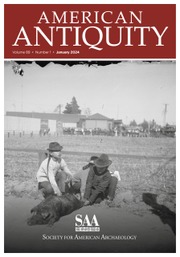No CrossRef data available.
Article contents
The Wiccomiss Indians of Maryland115
Published online by Cambridge University Press: 25 January 2017
Extract
That part of Maryland which lies east of the Chesapeake Bay has always, since the founding of the colony (1634), been known as the Eastern Shore; so, too, the Eastern Shore of Virginia. Most of it is a flat country of tidal rivers occupying “drowned valleys” into the heads of which flow sluggish freshwater streams. A low divide, or height of land, separates streams emptying into the Chespeake from streams flowing into the sounds of the Atlantic Ocean, or into Delaware Bay.
- Type
- Facts and Comments
- Information
- Copyright
- Copyright © The Society for American Archaeology 1938
Footnotes
A continuation of these notes on the Wiccomiss Indians will appear in a subsequent issue of this journal.
References
116 Maryland Archives, Vol. 3, p. 362; Narratives of Early Maryland, Clayton Coleman Hall, Editor, 1910, pp. 88, 89, 446, frontispiece, Map of Maryland, 1635.
117 Maryland Archives, Vol. 3, pp. 29, 32.
118 In his Aboriginal Maryland (Maryland Historical Magazine, Vol. XIV, p. 163), Dr. Raphael Semmes has it that Kent Island was inhabited by the Matapeke Indians, who lived at Indian Spring but later removed to Matapax Neck in the southern part of the island. Claiborne, in 1631, found about one hundred of them, but by 1641 they seem to have disappeared. I do not find these Indians in the index of Dr. Semmes’ recently published work, Captains and Mariners of Early Maryland, a large part of which is devoted to a discussion of the Indian tribes of this state.
119 There are no descriptions of patented lands earlier than 1658, except for Kent Island.
120 Plowden, Plantaganet, Description of the Province of New Albion, in Force's Historical Tracts, 2, p. 28.
121 State Land Office, Annapolis, Md., Patents, Liber 21, folio 365.
122 Cecill's map shows another island between “Monoponson” and the mouth of the bay on which he places “Wicomese.” This bay cannot be other than the mouth of Chester River; but, in reality, the upper part of Kent Island lies at the mouth of this river.
123 Narratives of Early Maryland, frontispiece.
124 Ibid., pp. 88–89.
125 Force's Historical Tracts, 2, p. 24.
126 Handbook of American Indians, Bulletin 30, Bureau of American Ethnology, 1, p. 637.
127 Maryland Archives, Vol. 2, p. 196.
128 Maryland Archives, Vol. 5, pp. 153, 269.
129 Maryland Archives, Vol. 3, p. 277.
130 Maryland Archives, Vol. 17, p. 174.
131 Cecil County Rent Roll, Calvert Papers, folio 123.
132 Pennsylvania Archives, Vol. 16, 2nd Series, p. 737.
133 State Land Office, Annapolis, Md., Chancery Proceedings, Liber P. C, 1671— 1716, folio 716.
134 Force's Historical Tracts, 2, p. 25.
135 Maryland Archives, Vol. 15, p. 146.
136 Land Office, Annapolis, Md., Patents, Liber 21, folio 544.
137 Baldwin's Calendar of Wills, Vol. 2, p. 98.
138 Patents, Liber D. D. No. 5, folio 832.
139 Patents, Liber I. L. No. B. folio 157.
140 Patents, Liber B. Y. & G. S. No. I, folio 122.


